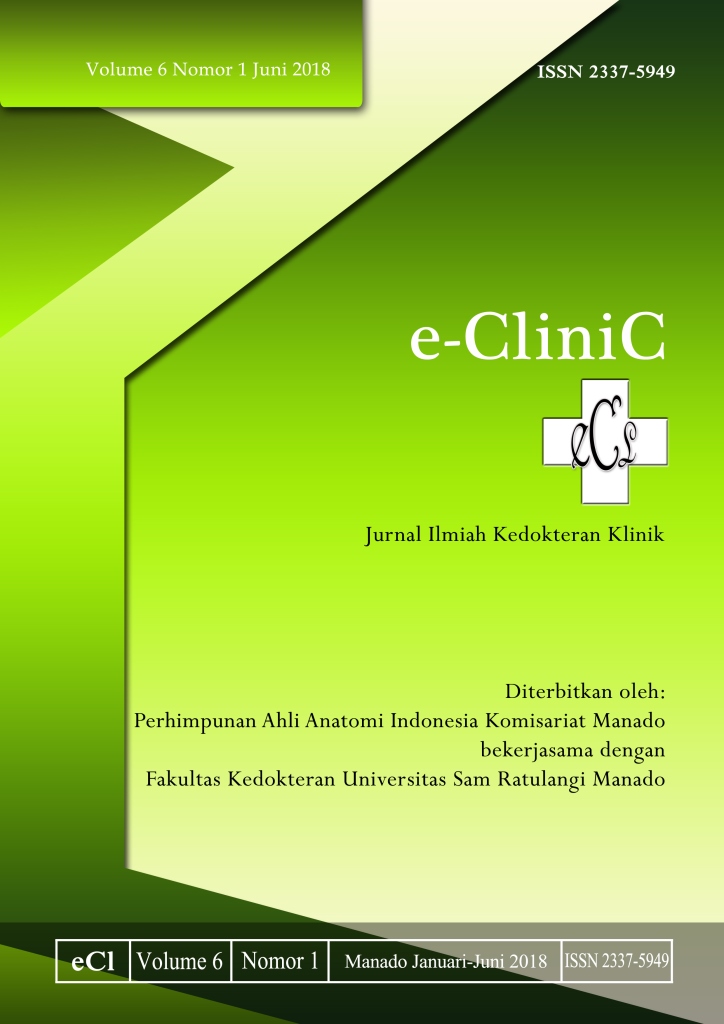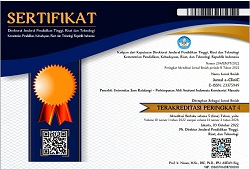Analisis Faktor- Faktor yang Memengaruhi Depresi pada Ibu Kandung yang Memiliki Anak dengan Retardasi Mental di Sekolah Luar Biasa Yayasan Pembinaan Anak Cacat Manado
DOI:
https://doi.org/10.35790/ecl.v6i1.18634Abstract
Abstract: The first common reaction in parents who have a retarded child is shock, fear, sadness, disappointment, guilt, rejection or anger. These conditions could potentially lead to psychological problems that can cause depression. There are many factors that can influence depression in biological mothers who have children with mental retardation. This study was aimed to analyze the factors that could influence depression in biological mothers who had children with mental retardation at the Special School of Coaching Disabled Children Foundation Manado. This was a descriptive-analytical study with a cross-sectional design. Data were obtained by using Hamilton Depression Rate Scale (HDRS) questionnaire and socio-demographic questionnaire. There were 17 biological mothers as respondents. The results showed that 11 respondents suffered form depression; 6 respondents (35.3%) with mild depression and 5 respondents (29.4%) with moderate depression. Meanwhile, six respondents (35.3%) had no depression. The factors that could influence depression were as follows: age (P = 0.332), education (P = 0.335), occupation (P = 0.586), marital status, number of children (P = 0.905), gender of children (P = 0.966), and level of mental retardation of the children (P = 0.774). Conclusion: There was no relationship between depression and factors that could influence depression in biological mothers who had children with mental retardation.
Keywords: depression, mother, child, mental retardation, HDRS
Abstrak: Reaksi umum yang pertama kali terjadi pada orangtua yang memiliki anak dengan retardasi ialah rasa kaget, takut, sedih, kecewa, merasa bersalah, menolak atau marah-marah. Kondisi seperti ini berpotensi memunculkan masalah psikologis yang bisa menyebabkan depresi. Terdapat banyak faktor yang memengaruhi depresi pada ibu yang memiliki anak retardasi mental. Penelitian ini bertujuan untuk menganalisis faktor -faktor yang dapat memengaruhi depresi pada ibu kandung yang memiliki anak retardasi mental di Sekolah Luar Biasa Yayasan Pembinaan Anak Cacat Manado. Jenis penelitian ialah deskriptif-analitik dengan desain potong lintang. Data diperoleh melalui kuisioner Hamilton Depression Rate Scale (HDRS) dan kuisioner sosio-demografi. Responden penelitian berjumlah 17 orang ibu. Hasil penelitian menunjukkan ibu yang mempunyai anak retardasi mental mengalami depresi sebanyak 11 responden dengan 6 responden (35,3%) depresi ringan dan 5 responden (29,4%) depresi sedangkan yang tidak mengalami depresi sebanyak 6 orang (35,3%). Faktor-faktor yang dapat memengaruhi depresi pada ibu yaitu usia (P= 0,332), pendidikan terakhir (P=0,335), pekerjaan (P=0,586), status pernikahan, jumlah anak (P=0,905), jenis kelamin anak (P=0,966), dan tingkat retardasi mental anak (P=0,774). Simpulan: Tidak terdapat hubungan antara faktor-faktor yang memengaruhi depresi dengan depresi pada ibu.
Kata kunci: depresi, ibu, anak, retardasi mental, HDR
Downloads
Published
How to Cite
Issue
Section
License
COPYRIGHT
Authors who publish with this journal agree to the following terms:
Authors hold their copyright and grant this journal the privilege of first publication, with the work simultaneously licensed under a Creative Commons Attribution License that permits others to impart the work with an acknowledgment of the work's origin and initial publication by this journal.
Authors can enter into separate or additional contractual arrangements for the non-exclusive distribution of the journal's published version of the work (for example, post it to an institutional repository or publish it in a book), with an acknowledgment of its underlying publication in this journal.
Authors are permitted and encouraged to post their work online (for example, in institutional repositories or on their website) as it can lead to productive exchanges, as well as earlier and greater citation of the published work (See The Effect of Open Access).







